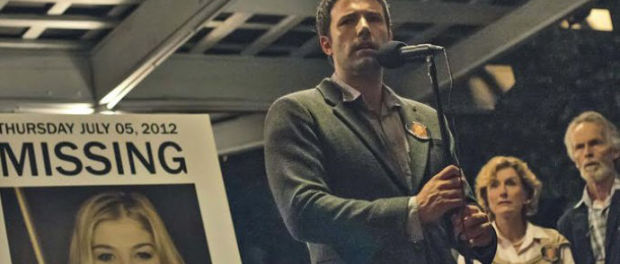Into Thin Air: Review of Gone Girl
Gone Girl is the latest film by director David Fincher. It stars Ben Affleck and Rosamund Pike as a couple stuck in an unhappy marriage. Despite a passionate beginning the couple’s relationship begins to deteriorate after both partners lose their jobs and move away from New York City back to Missouri in order to care for Affleck’s dying mother. Gone Girl begins the morning of the couple’s fifth anniversary suddenly when Nick (Affleck) returns home only to find the house suspiciously empty and in disarray. This discovery sets up the film as a mysterious thriller which deals with such complex issues as infidelity, deceit, media sensationalism, and the difficulties of maintaining a marriage.
David Fincher has made a name for himself with such films as Seven (1995), The Social Network (2010), and The Girl with the Dragon Tattoo (2011). Gone Girl is based on Gillian Flynn’s best selling novel which was adapted to the big screen by the author herself. Film buffs should note that the film includes a number of ironic elements. For example Ben Affleck made his feature film directorial debut in 2007 with the similarly entitled flick Gone Baby Gone. Also, in 1997 the actor starred in Kevin Smith’s pic Chasing Amy and in Gone Girl his character’s wife’s just happens to be named Amy.
The narrative of Gone Girl explores the depths some people will sink to while in the midst of a disintegrating marriage. From the outside Nick and Amy Dunne (Rosamund Pike) seem to have a picture perfect life. They own a big house, a quaint neighborhood bar, and have both had successful writing careers. Upon closer inspection, however, it’s clear that these characters don’t like each other and are on the brink of divorce. Anger and resentment has replaced the love and affection they felt for one another during the early stages of their relationship.
Although the first hour or so of Gone Girl is promising once a major plot point is revealed the film becomes suddenly becomes disjointed, overly complicated, and muddled in unnecessary extraneous material. From here onward the plot is rendered harder and harder to follow. Unfortunately Gone Girl is also mired by some unintentionally humorous dialogue courtesy of Amy Dunne whose character ends up personifying the stereotype of a scorned woman. Pike’s performance calls to mind that of Deborah Kara Unger’s distant almost robotic performance in the 1996 cult film Crash.
Gone Girl includes a number of positive elements such as moments of sharp dialogue as well as the portrayal of the media and how shows such as Nancy Grace serve to sensationalize news stories and thus manipulate public perception of these crime stories.
Like David Fincher’s 2011 film adaptation of The Girl with the Dragon Tattoo Gone Girl is much longer than it should be. Towards the end of the film most viewers will probably find themselves squirming in their seats and wondering when, if ever, it will end. This might be due to the fact that the novelist/ screenwriter wanted to include all aspects of the source material.
Gone Girl begins and ends with Nick looking at his wife and musing, “What are you thinking? How are you feeling? What have we done to each other?” Perhaps these three questions sum up the film’s central theme regarding marriage and relationships. Gone Girl asks if we ever really know our partner or anyone else for that matter. Maybe ignorance really is bliss.
Gone Girl is in theatres now.







